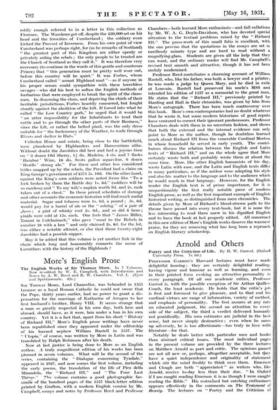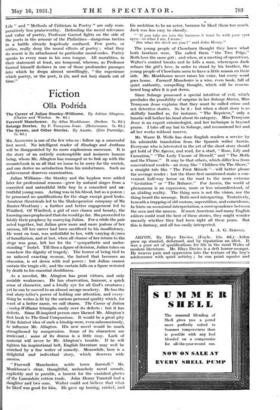Arnold and Others
Poetry and the Criticism of Life. By W. Garrod. (Oxford
University Press. 7s. 6d.)
PROFESSOR GARROD'S Harvard lectures must have made delightful hearing ; they are certainly delightful reading, having vigour and humour as well as • learning, - and _ even in their printed form evoking an attractive personality in every paragraph. Of all our academic critics, Professor Garrod is, with the possible exception of Sir Arthur Quiller- Couch, the least academic. He holds that the critic's job is first and foremost to give pleasure, and. to . that end his cardinal virtues are range of information, variety of method, and emphasis of personality. The first assures at any rate an educated judgment, the second an attention to every side of the subject, the third a verdict delivered humanly not pontifically. His own estimates are judicial in the best sense, but never simply destructive ; even when he sums up adversely, he is too affectionate—too truly in love with literature—for that.
. Notably he deals better with particular men and books than abstract critical issues. The most individual pages in the present volume are provided by the three lectures on Matthew Arnold as poet and critic.. The opinions_ passed are not all new or, perhaps, altogether acceptable, but they have a quiet independence and originality of statement which stir the mind freshly to think over them. Emerson and Clough are both " appreciated " as writers who, like Arnold, receive to-day less than their due. " In Oxford if I am caught reading Emerson it is as though I were caught reading the Bible." His restrained but catching enthusiasm appears effectively in the corhments on The Testament of Beauty. The lectures on " Poetry and the Criticism of Life " and " Methods of Criticism in Poetry " are only com- paratively less praiseworthy. Defending the moral relevance and value of poetry, Professor Garrod fights on the side of the poets in the armour of the Philistines—dangerous tactics in a battle already hopelessly confused. Few poets, or critics, really deny the moral effects of poetry ; what they do resent is its attachment to particular moral codes. Poetry speaks to every man in his own tongue. All moralities, in their statement at least, are temporal, whereas, as Professor Garrod himself declares in one of those profounder passages into which he drops almost unwillingly, " the experience which poetry, or the poet, is (is, and not has) stands out of time."



















































 Previous page
Previous page